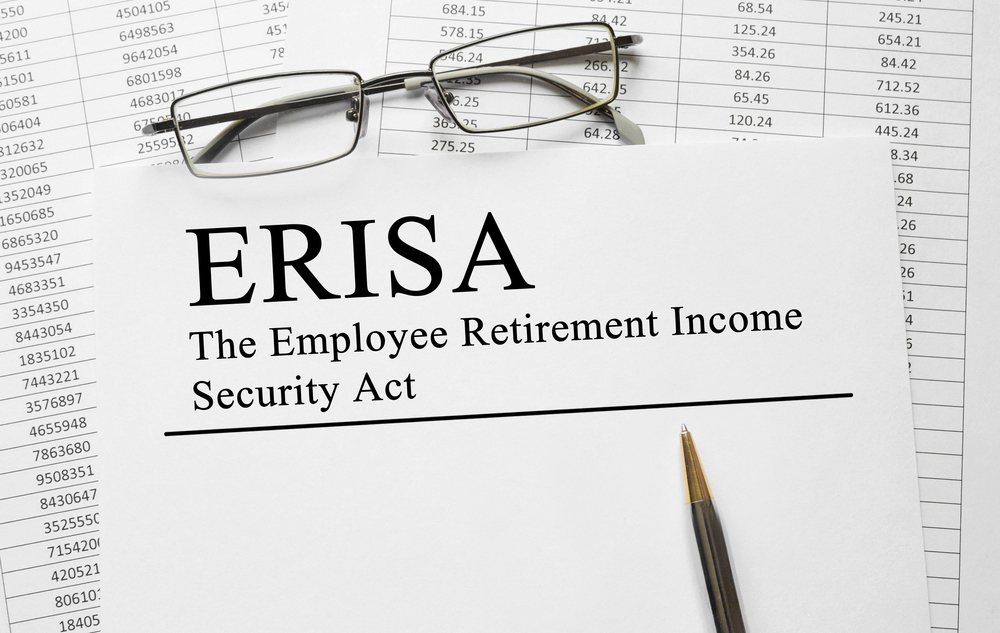Group Insurance (ERISA)

Group insurance can be either short-term disability insurance or long term disability insurance provided by or purchased through an employer. When an employee in Bucks County or Greater Philadelphia purchases a group insurance policy through an employer, any claim for benefits under the policy is managed by ERISA (Employee Retirement Income Security Act).
ERISA is a complicated law that was originally intended to protect employees’ rights to their benefits. However, that is no longer the case. Now, it is widely accepted that ERISA strongly favors insurers, not disabled claimants.
At Rosen Moss Snyder LLP, whether you’re in Bucks County or the Philadelphia region, we suggest you contact a team of attorneys that has a history of providing exceptional disability insurance legal services before filing a claim or an appeal.
Here Are Some Reasons Why:
- The ERISA Claims Process Is Complicated – ERISA strictly enforces rules, requirements, and deadlines which are understood by insurance providers but not by many disabled claimants. A denied claimant has 180 days to appeal his or her denied claim, and insurers then have up to 90 days to consider and respond to the appeal. Before a federal lawsuit can be filed, the denied claimant must first “exhaust administrative remedies” by submitting a written appeal to the denying insurer. During the entire time, the disabled claimant is without income from his or her job.
- Proving Your Case Can Be an Uphill Battle – Since appeals are based upon medical evidence in the claims file, it is crucial that the claims file is stacked with compelling medical evidence both supporting the disability and refuting the insurer’s basis for denying the claim. ERISA gives insurers in the Philadelphia region and beyond wide discretion to administer policies and to determine the disabled claimant’s eligibility for benefits under their own policy. It is very difficult – without experienced legal counsel – to prove that an insurance company wrongfully denied a claim and “abused that discretion.”
- SSDI Can Be a “Catch 22” – Most ERISA disability policies require a disabled claimant to apply for SSDI benefits. If a disabled claimant is awarded SSDI benefits, the insurance carrier usually is able to offset the claimant’s monthly SSDI benefit from any amount it may owe the claimant. Under ERISA, the insurer is not compelled to pay benefits just because a disabled claimant was awarded SSDI benefits. Conversely, if a disabled claimant is denied SSDI benefits, the insurer may use that against the disabled claimant.
- You May Need to File a Lawsuit in Federal Court – If your case is denied after the internal appeal process, then a lawsuit in U.S. District Court is the final option. Suits filed under ERISA and cases are decided by not by a jury, but by a judge. Cases are decided on briefings of the attorneys who argue based only on the evidence provided in the claim’s file, which is why having a complete claims file before filing suit is so crucial.
- The Whole Process is Unfair – In reality, few disabled persons have the time, energy, or resources to put up a fight against a strong, well-versed insurance company. Insurers know this. The law firm of Rosen Moss Snyder LLP takes viable long-term disability cases on a contingency basis. This means, if they’re not successful, you don’t pay.
Navigating the Appeals Process
It cannot be overstated that a claimant in the Philadelphia region who has been turned down for disability benefits, or whose disability benefits have been terminated, will require competent lawyers, well versed in ERISA litigation. As was stated above, the ERISA claims process is designed to favor the insurers with large, dedicated legal teams. Attempting to file a claim or an appeal of a claim denial without an attorney can severely impact your chances of obtaining a favorable result.
The Need for Experienced, Skilled Legal Counsel
It is nearly impossible and certainly impractical for any disabled claimant to attempt to traverse through the virtually endless maze of an insurance company’s “claims team” (i.e., the “Claim Specialist”, the “Appeal Specialist”, the “In-house Nurse,” the “Peer-Review physician,” the “Vocational Specialist,” and the “Surveillance Specialist”) without a lawyer. The disabled claimant may have to parse through and decipher a “Labor-Market Survey, ” or a Functional Capacity Exam, or an Independent Medical Exam report, or a Peer Review Report, or the dreaded video surveillance.
A claimant rarely has the skill, knowledge or the energy to successfully fight an ERISA insurer without an attorney or trusted team of lawyers.
Read More
The Four Stages of an ERISA Claim
A disability intake can take many forms. For example, a disabled claimant may not even know he or she has insurance through their employment. Alternatively, a disabled claimant may still be working and seek counsel and guidance on the medical, financial and personal issues involved with applying for benefits. Most often though, a distraught claimant will unexpectedly learn through an insurer’s certified letter, that he or she was not considered to be entitled to disability coverage.
A disability intake can be fairly segregated into four distinct stages. It is critical for an experienced and skilled ERISA disability lawyer to identify the claim status, and to react and respond appropriately to his client’s legal needs and interests.
Each of the stages of an ERISA claim has its own special issues and challenges, even for an experienced and skilled ERISA disability lawyer, and will be addressed below.
- Facilitating an application for benefits (Presently Disabled and Not Working) – It is not unusual for a disabled person to be completely unaware that he or she has disability coverage as an employee benefit through his job. A plaintiff’s lawyer will frequently encounter such a person in the context of a workers’ compensation claim, a disabling personal injury claim, or a claim for Social Security Disability (SSDI) benefits. A disabled person who thinks he or she may have disability coverage through their employment should always inquire whether there may be additional disability coverage available through the employer. Most group disability policies provide for an offset for SSDI benefits or workers’ compensation benefits. However, many policies have a minimal monthly payment irrespective of whether the claimant is receiving any other ancillary benefit.
- Facilitating an application for benefits (Presently Disabled and Working) – This scenario arises when a disabled person continues working notwithstanding their progressively deteriorating physical/medical condition, often times against the advice of their treating physician. Frequently, a person will readily acknowledge that his/her work is suffering as a result of the disability. The individual is often times justifiably fearful of being terminated from her job. It is not uncommon for an employee to have a well-paying management position and withhold their disability from peers for profoundly personal and professional reasons.Often, it is beneficial for a disabled person in this type of situation to review and discuss with an ERISA disability lawyer, the employee handbook to ascertain what benefits are available (e.g., STD and/or LTD). Also, the employee may want to discuss whether the condition is an interim disability (i.e., STD) or rather a prolonged or permanent disability (i.e., LTD). SSDI issues should also be discussed. A claimant at this stage is often confused and terrified. Such a dilemma, is quite often a conundrum. On one hand, if you continue working and get fired for performance-related issues, you may lose your standing to apply for group disability benefits. On the other hand, it is often times emotionally and financially devastating to concede to a disability and apply for benefits. Notwithstanding a disabled person’s decision on whether to continue working, it is critical to fully engage the treating physician. It is axiomatic that a disability application will not be approved without credible medical documentation.
- Application for STD/LTD benefits denied/terminated (appeal available) – The following hypothetical is unfortunately almost commonplace. A disabled claimant applies for disability benefits on her own with her physicians’ unequivocal and total support. She has worked for the same company for 25 years and it was only with forethought and trepidation did she go out on disability. It never even dawned on her that the insurer would even consider denying her claim. She has children and is the primary earner for her family. She has just received a certified letter from the insurer that a nurse consultant to whom she never spoke with, disagrees with her treating physicians and determined “that medical documentation does not support disability.” The insurer’s nurse consultant never even placed a call to her treating physicians.The above scenario represents the most frequent type of ERISA disability claim. An experienced and skilled ERISA lawyer must parse through the emotional issues and pragmatically address the issues germane to the claim being denied. This includes an in-depth understanding of the insurer’s basis for denying/terminating the claimant’s claim (e.g., pre-existing condition, lack of medical records, no objective support, mental health/soft tissue, plan limitations, change from “own-occ” to “any-occ”).For an appeal to succeed, it should directly and substantively refute the insurer’s basis for denying benefits. Each case is very fact specific. For an ERISA disability lawyer to be successful, he cannot take a “cookie cutter” approach. Open communication with the treating physicians is critical. A partial listing of “documentation” which may be supplied on appeal to the insurer is listed below:
- Application for STD/LTD benefits denied/terminated (administrative remedies exhausted) – Often times, a disabled claimant will appeal on his or her own and only seek legal counsel after receiving an insurer’s denial letter in which the last paragraph states “administrative remedies are exhausted.” This means no further appeals will be considered, and a claimant’s only recourse is to file a federal lawsuit. Under ERISA regulations, a claimant is not allowed to introduce any additional medical records during litigation. Also, traditional “discovery” is generally unavailable for an ERISA litigant. In these types of situations, it is often beneficial for a disabled claimant to sit down and review the complete medical and insurance claims file with an experienced ERISA disability lawyer.
ERISA Claim Buyouts
Unlike personal injury or workers’ compensation claims, ERISA insurers typically will not discuss a settlement of a disputed claim prior to the commencement of a lawsuit. However, often times, on accepted claims in which the benefits are being paid, the insurer will have real interest in discussing a lump sum buyout. In these situations, it is often prudent for the ERISA practitioner to contact the insurer to gauge settlement interest. The value of a lump-sum buyout is very case specific and involves several integrated factors to take into consideration; including, age, mortality, monthly benefits and likelihood of returning to gainful employment.
![]()

